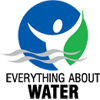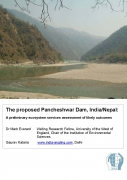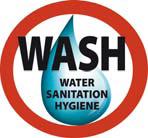Government Programmes
Invitation for case study submission in water magazine
Posted on 06 Aug, 2010 11:26 AM
Our publication is coming up with the annual "Case Study Special Issue” in Sept. 2010. Its a collector’s issue, where we are covering leading industries across the globe.
UN affirms the right to safe and clean drinking water
Posted on 02 Aug, 2010 02:56 PMA remarkable piece of water history should have been headline news everywhere this week.
Deaths due to water pollution
Posted on 02 Aug, 2010 02:38 PMDeaths due to water pollution occur mainly as a consequence of drinking of contaminated water. The common diseases caused by consumption of contaminated water are Cholera, Viral Hepatitis, Enteric Fever (Typhoid) and Acute Diarrhoeal Diseases (ADD).
The number of deaths reported State-wise on account of Cholera, Viral Hepatitis, Enteric Fever (Typhoid) and Acute Diarrhoeal Diseases (ADD) for the years 2007, 2008 and 2009 are given in Annexure – I-III.
India WASH forum e-newsletter - Update 13 July 2010
Posted on 02 Aug, 2010 11:56 AMWe see this newsletter as a platform for independent credible voice in the water and sanitation sector. Our emphasis is on bringing together critical news and information with analysis. In this issue we share news and analysis on topical issues and developments.
The Department of Drinking Water and Sanitation(DDWS) has simultaneously invited inputs to Discussion Papers on Drinking Water and Sanitation, circulated on Solution Exchange. Inputs given by India WASH Forum, on this, is enclosed in this Update. We have pointed out the missing elements of sanitation improvement strategy that include, criticality of providing water as an inseparable component to household sanitation, the tendency to see behavior change as a lifestyle issue and not linked to the hardware components, peoples livelihoods and living conditions. Suggestions for what needs to be done to strengthen the implementation mechanism of the flagship sanitation programme(TSC) and partnerships.
A preliminary ecosystem services assessment of likely outcomes of the proposed Pancheshwar dam in India/Nepal - An IES report (2010)
Posted on 02 Aug, 2010 02:24 AM This report by the IES presents the findings of a study that explores the likely impacts of the recent proposals in India to build a dam at Pancheshwar in the Himalayas on the river ecosystems and the surrounding areas and people involved. This dam will be the world's second tallest structure intended to harness hydroelectric power and water by controlling the flow of the Kali river and its tributaries.
This report by the IES presents the findings of a study that explores the likely impacts of the recent proposals in India to build a dam at Pancheshwar in the Himalayas on the river ecosystems and the surrounding areas and people involved. This dam will be the world's second tallest structure intended to harness hydroelectric power and water by controlling the flow of the Kali river and its tributaries.
The document argues that although there are many benefits of the dam in terms of energy and water, the wider ramifications of the dam and its consequences for the people staying around the area have not been thought about in the planning process. The planning process has not engaged local people in the decision-making process, there is paucity of published information and the environmental and social consequences have been considered belatedly in the planning process.
National Rural Drinking Water Programme - Framework for implementation - MoRD (2010)
Posted on 02 Aug, 2010 01:46 AMThe Government of India launched the Accelerated Rural Water Supply Programme (ARWSP) in 1972-73 to ensure provision of adequate drinking water supply to the rural community through the Public Health Engineering System.
The second generation programme started with the launching of Technology Mission in 1986-87, renamed in 1991-92 as Rajiv Gandhi National Drinking Water Mission. Stress on water quality, appropriate technology intervention, human resource development support and other related activities were introduced in the rural water supply sector.
The third generation programme started in 1999-2000 when sector reform projects evolved to involve community in planning, implementation and management of drinking water related schemes, later scaled up as Swajaldhara in 2002.
The Rural Water Supply (RWS) sector has now entered the fourth phase with major emphasis on ensuring sustainability of water availability in terms of potability, adequacy, convenience, affordability and equity while also adopting decentralized approach involving PRIs and community organizations.
Decentralisation and water resources management in the Indian Himalayas: The contribution of new institutional theories - Conservation and Society paper
Posted on 02 Aug, 2010 01:31 AMThis paper discusses the relevance of the process of decentralisation in water resources management. The paper argues that decentralisation is not about formulating a top-down reform package to transfer power from central government to other actors to manage water resources, nor is it about emphasising the existence of the bottom up agency.
Rather, the paper draws on "New Institutionalism" and argues that decentralisation is a complex adaptive process that involves natural as well as political actions of actors and agents who draw on existing structures to negotiate and renegotiate the existing unequal power relations to manage water.
Water sector and reforms - Report of workshop organised by CASUMM (2007)
Posted on 02 Aug, 2010 12:08 AMThe workshop was organised in response to the implementation of two water supply projects in Bangalore and Mysore as a part of the Water Sector Reforms under the Jawaharlal Nehru National Urban Renewal Mission (JNNURM) and the increasing trend of privatisation under the water sector reforms in cities like Bangalore and Mysore.
It was felt that there was a need to raise awareness among citizens and groups in Bangalore and Mysore regarding the implications of privatisation and the mechanisms through which privatisation was being introduced in the cities in India.
Water distribution improvement "World Bank style" in K-East Ward Mumbai - A working paper by CASUMM
Posted on 01 Aug, 2010 03:43 PMIn this document by CASUMM, the author raises important questions regarding the recent trends towards privatisation of water supply in Indian cities by discussing the case of the water supply scheme project in the K-east ward of Mumbai.
The privatisation of the water supply scheme, which has been implemented through grants by the World Bank (WB) raises serious questions regarding the intentions of the international organisations that fail to take into consideration the local context and the needs of the people and focus exclusively on profit making.
Water challenges in Greater Bangalore - NIAS-CASUMM workshop note (2007)
Posted on 01 Aug, 2010 03:36 PMThis document provides the background for a workshop on 'Water Challenges in Greater Bangalore', organised by NIAS and CASSUM at the National Institute of Advanced Studies (NIAS), Indian Institute of Science (IISC) campus on March 27, 2007.
The document highlights the current scenario of privatisation of water services that are being funded by international financial institutions under the water sector reforms in the city of Bangalore, which have had a very negative impact on the urban poor, who continue to face the problem of inadequate, unreliable and unsafe water supply as compared to other posh and water rich areas in the city.






